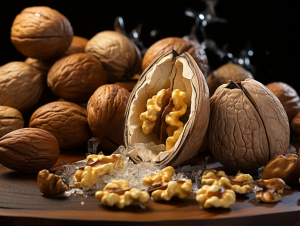Donations.
It’s one of the primary themes of the four parshiyos which discuss the construction of the Mishkan that we are currently in the midst of. And there’s a fascinating Midrashic statement regarding donations – or put more precisely, donors – that comes up in the least likely of places.

Tosafos bases this interpretation on a Midrash that comments at length on the pasuk in Shir HaShirim 6:11 that states, “El ginas egoz yaradti, I went down into the walnut garden”. The Midrash (Pesikta Rabasi 11) provides a host of explanations as to the significance that the Jewish people are allegorically referred to as walnuts. And one of those explanations goes as follows.
There are three types of walnuts: parach, beinonim, and katronim. The shell of the parach type of walnut essentially crumbles off on its own, the shell of the beinonim type of walnut you give it a whack and it cracks open, but the shell of the katronim type of walnut is exceedingly difficult to break open. You wind up needing to bash it with a rock and then you’re not really left with any nut to speak of. So too is it with the Jewish People. There are certain types of Jews who do a mitzvah of their own accord, there are the type who if you urge them to do it then they respond positively, and then there is the type that even if you hit them up numerous times it is to no avail. Nevertheless, said Rabbi Levi, the door that does not open for a mitzvah will open for a doctor.
It is clear that the recalcitrant type of Jew who simply refuses to give is fully included in the Jewish People. This is striking given the fact that the Sages say that the three identifying signs of Jews is that they are compassionate, bashful, and kindness-doers (Yevamos 79a), and the Sages further say that a person who is obstinately brazen “it is known that his ancestors did not stand by Mount Sinai” (Nedarim 20a). Of course, that is an aggadic statement and must be understood as such, which, more often than not means that it is not meant to be understood in a simplistic, literal manner.
Still and all, it is clear that, at the very least, the Sages held very strongly that a Jew who does not act with compassion and refuses to help his fellow Jews in need is thus compromising his essential Jewish quality. It is striking, therefore, that the above-quoted Midrash lists the impossibly stingy people as full fledged members of the clan, indicating that, although their behavior is wrong-minded and negative, there is nothing about it that would compromise their Jewish character. So how are we to make sense of that?
Enter an eye-opening story.
Rabbi Fischel Schachter related that he once had the merit of driving Rav Yaakov Galinsky zt”l around on a fundraising round. When they arrived at a certain home, Rav Galinsky knocked on the door which was opened by a boy. Rav Galinsky asked the boy if his father is home. The boy turned towards the side and a not-particularly-subtle whispering back-and-forth ensued. The boy turned back to Rav Galinsky. “My father is not home”.
Not one to be easily put off, Rav Galinsky leaned in towards the doorway and called out to the homeowner, “Pinchas! If when you’re home you’re not home, then what will be when you truly will not be home?!”
Pinchas came to the door irate. “I am not interested in supporting your good-for-nothing bench-warmers! I learn a lot and I also work for a living. What gumption you have expecting that I should give of my hard-earned money to support your avreichim who just want to rely on others for their livelihood…” Rav Galinsky began to vigorously argue with Pinchas and it was like fireworks going off. The two of them were practically at each other’s throats and Rabbi Schachter felt like he wanted nothing more than but for the ground to swallow him up.
Wonder of wonders, by the time the storm settled, Rav Galinsky walked out of there with a very sizable check and Pinchas was all smiles and warmth!
Once back in the car, Rav Galinsky turned to Rabbi Schachter and locked eyes. “Listen close young man,” he said pointedly, “to what I am about to tell you. When I knock on someone’s door and they pleasantly invite me in and serve me a cup of tea, I know I am not going to get more than fifty dollars from them. But when I get to someone’s house and he wants to just slam the door in my face, that is when I know that there is potential for me to get a significant donation!”
You see, some people are just not going to be told what to do. You can hit them up as many times as you please, but it will get nowhere. They’ve got an unbreakable outer shell. But here’s the thing about nuts and pits that have impossibly impenetrable shells: if you leave them on the moist ground, a delicate seedling will sprout forth that penetrates and cracks the shell with ease.
Because it is that very life force that generates the impenetrable shell to begin with.
There are certain types of Jews, the Midrash is telling us, that are not lacking in compassion and loving-kindness in any way. But they are incredibly independent minded. They are not the type who will be told what to do. Rather, the way to get them to give is to allow their fighting spirit to come to the fore. You cannot just hit them up. It won’t work. They need to come to their own conclusion that making the donation is the right thing and that they want to do it. Give them the opportunity to come to it on their own, and the very same force of will that creates an impenetrable shell around them will put forth a beautiful contribution. Much bigger and significant, in fact, than those who respond easily to outside demands.
When you’re dealing with a person who is a hard nut to crack, don’t try to break through his shell. It won’t work. Instead, facilitate the arousal of his incredibly forceful power of will and he will crack through his shell all on his own. And what will then come through will be magnificent indeed.
If you enjoyed this InspiredTorah post, please share it with 2 other people who will also benefit from it.
Send them this link:
https://inspiredtorah.com/hard-nut-to-crack/
Thank you,
Yehoshua Berman
